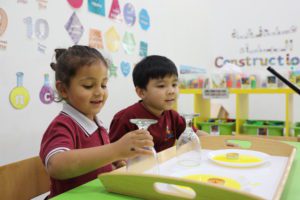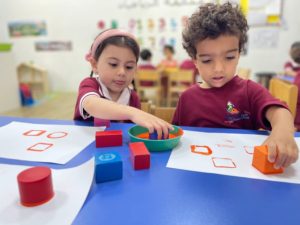Facility Tour

The principles which guide our practice are from the British Early Years Foundation Stage (EYFS) Curriculum.
Every child develops at their own pace and in their own way with a unique set of interests. So, their stage of development may not necessarily directly reflect their age, when planning for your child, their stage of development will be taken into consideration and staff will work with them accordingly.
We accept children from 2 months up to 4 years. Age variation within any specific class is usually no more than 8 months between the youngest and oldest child in the classroom.
Our classrooms are uniquely designed and have selected areas that encourage learning dependent on the child’s age. Each area is well equipped with a wide selection of high-quality age appropriate resources and toys. Children are free to explore and investigate these areas independently in a safe environment.
Infants
Our baby program focuses on care, comfort and trust, alongside explorations of wonder, based on the senses. Babies are part of our family group, interacting with older children to provide warm and stimulating engagement.
Our practitioners individually interact with the babies, observing carefully what they like and don’t like and what is of interest to them, respecting their schedules and activities on their individual needs.
The staff to child ratios are very low at this age at one member of staff to three babies, each member of staff will have ‘Key Children’ allocated to them and you will be informed about which member of staff is the Key Worker for your child. We will provide a wide variety of experiences, which involve all the senses encouraging learning in a stimulating environment in accordance with the stage of the child’s natural development. The staff are caring and nurturing, who respond appropriately to the needs of each child in line with the EYFS.
You will receive information about your child on a daily basis with regards to their feeding and nappy changes throughout that day. Any other significant developments will also be discussed with you upon pick up.
Young Preschooler
Children in this age group concentrate on being creative, using imagination to ‘discover’ and develop problem-solving skills. Initial literacy steps are made by language acquisition through key development activities such as role-play and shared reading.
We provide them with the time, the resources and the stimulus to investigate; the support to learn and the gentleness to challenge their assumptions. Children bring the topics and ideas, the events come from their daily environment and they are supported by adults who introduce scientific, literary and mathematical ideas.
The Nursery Class plans opportunities for child-adult discussion, where we encourage children to contribute more during daily circle time where they attempt putting sentences together. ‘Open expression’ allows children to discover with a variety of materials, nurturing motor skills. Children discover and enjoy making marks, looking at picture books and listening to stories, giving meaning to communication.
Staff address areas such as eating, dressing and toileting, which allow for self-help and independence to emerge. With physical skills developing further, children are taught to join in active play with other children and it is an important time for discovering boundaries and social interaction.
Important steps in Literacy are made here as language acquisition is accelerated and key areas such as role play and shared reading support this development. Carefully planned opportunities for discussion allow for language to develop rapidly with many able to put sentences together. Allowing the children to explore with a variety of materials so that fine motor skills continue to develop and they enjoy making marks, looking at picture books and listening to stories giving meaning to communication. Staff are committed to support and encourage children in areas such as eating, dressing and toileting, which will allow for self- help and independence to emerge. We believe in creating a positive environment and praise new achievements to help build self-esteem. With physical skills developing further, children are taught to join in active play with other children and it is an important time for learning about dangers and safe limits.
Toddlers
When children are ready to step forward into the next stage of their development, they transition into our Preschool Class. At this age, skills can develop rapidly. Children use their foundation core skills developed earlier on creating new ideas and new ways to tackle problems. There are no set boundaries for children to explore their ideas!
Children are encouraged in joint-play activities, exploring an understanding of the wider world, inventing scenarios and using their imaginations in their ideas and games. These activities help children to learn important social skills of sharing and cooperating. Children’s developing understanding of cause and effect is encouraged in this class and we explore further literacy, math and communication supporting the preparation for school.
The Early Years Foundation Stage curriculum allows toddlers to be creative, explore and use their imagination to discover, develop and encourage problem solving skills. Our approach will help children to build on their communication, social, cognitive and self-help skills. We will achieve this by providing a safe and stimulating environment, with carefully planned activities with age-appropriate resources allowing the children to learn through play and have fun while they grow.
Preschooler
When children are ready to step forward into the next stage of their development, they transition into our ‘Pre – school’ Class. At this age, skills can develop rapidly. Children use their foundation core skills developed earlier on ‘Inventing’ new ideas and new ways to tackle problems. There are no set boundaries for children to explore their ideas!
Children are encouraged in joint-play activities, exploring an understanding of the wider world, inventing scenarios and using their imaginations in their ideas and games. These activities help children to learn important social skills of sharing and cooperating. Children’s developing understanding of cause and effect is encouraged in this class and we explore further literacy, math and communication supporting the preparation for school.
Our curriculum program focuses strongly on increasing their independence and problem-solving abilities as well as equipping your child with the necessary social and personal skills to help them cope well with change, challenge, conflict and choice.
At this stage with an increased interest in joint play activities such as role play, construction and games help children to learn the important social skills of sharing and cooperating. Children will learn and play in small groups helping to foster the development of social skills. Children’s developing understanding of cause and effect is encouraged by the introduction of a wider variety of equipment, media and technologies. We aim to support the children with a wide range of interesting materials activities, as Literacy and Numeracy skills can develop rapidly at this stage. Children’s language is now much more complex, as many become adept at using longer sentences. Conversations with adults become a more important source of information, guidance and reassurance. One’ of the ‘Letters and Sounds’ scheme will be introduced with the class and ‘Jolly Phonics’ will be phased in during the last term or as the needs of children dictate. Literacy and problem solving, reasoning and numeracy skills continue to develop.
Resources and Materials
 At Creative Kids Academy Nursery we believe in providing the right resources and opportunities for children to develop that encompass all seven areas of the curriculum. Resources are age appropriate, relevant and engaging allowing children to feel safe and push the boundaries of their play to extend their learning. The learning environment is carefully designed to stimulate and motivate children to learn with qualified staff to facilitate the process of learning. All resources are checked for compliance with safety standards.
At Creative Kids Academy Nursery we believe in providing the right resources and opportunities for children to develop that encompass all seven areas of the curriculum. Resources are age appropriate, relevant and engaging allowing children to feel safe and push the boundaries of their play to extend their learning. The learning environment is carefully designed to stimulate and motivate children to learn with qualified staff to facilitate the process of learning. All resources are checked for compliance with safety standards.
